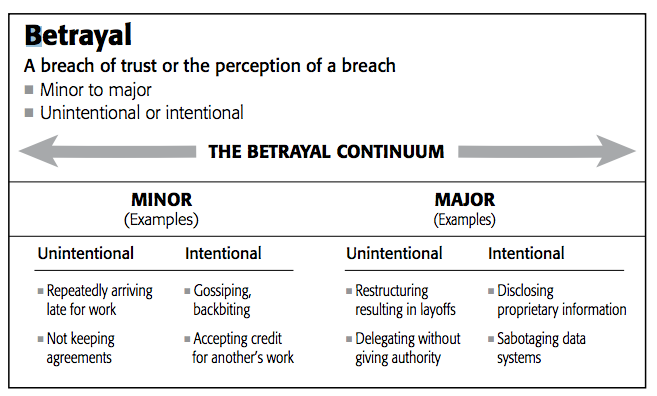Betrayal at Work
Betrayal is a violation of trust, which is why it feels so gut-wrenchingly awful and can come as such a shock. We often don’t or can’t see it coming. And we’re often left flatfooted in terms of how to deal with it. Our anger or resentment may cause us to want to get even. Before we know it, an angstrom of deceit has built into a galactic war between us and our former friends or trusted coworkers.
When my clients feel betrayed, I often refer them to the work of Dennis and Michelle Reina, authors of Rebuilding Trust in the Workplace. The Reinas created a Betrayal Continuum, which helps put a particular experience of betrayal into context.
Betrayal Continuum
As the Betrayal Continuum indicates, betrayals can be intentional or unintentional, and they can be minor or major in terms of the consequences. Understanding where a particular betrayal falls on the spectrum may be helpful. You might tell a coworker, for instance, that you know it’s not intentional and that it’s a minor issue in the grand scheme of things, but that you feel like his arriving late to work is, in fact, a betrayal, as well as a challenge to your authority.
If you want to further quantify the betrayal(s) of an individual or yourself, here’s an exercise that I derived from material found in Rebuilding Trust in the Workplace.
Evaluate Degree of Betrayal at Work
I encourage clients to have their coworkers, direct reports, and superiors fill out this form, too, so that the individual gets a 360-degree view of how their untrustworthy behavior is perceived by and affects others.
Betrayal can create a vicious cycle. The more you feel betrayed, the more likely you are able to rationalize your own betrayal of others. You’ve got to nip this cycle in the bud. Here’s a seven-step process that Dennis and Michelle Reina recommend:
Seven Steps to Stop Betrayal and Rebuild Trust
- Observe and acknowledge what has happened
- Allow feelings to surface
- Get and give support
- Re-frame the experience
- Take responsibility
- Forgive yourself and others
- Let go and move on
Don’t let betrayals go unchecked. And don’t retaliate, since that will only make the situation worse and likely draw others into the fray. Take the Reinas’ expert advice. Use these seven steps to address betrayals as they happen; in doing so, you’ll prevent future betrayals. You’ll also work in a far more harmonious environment.
Elements of Leadership








